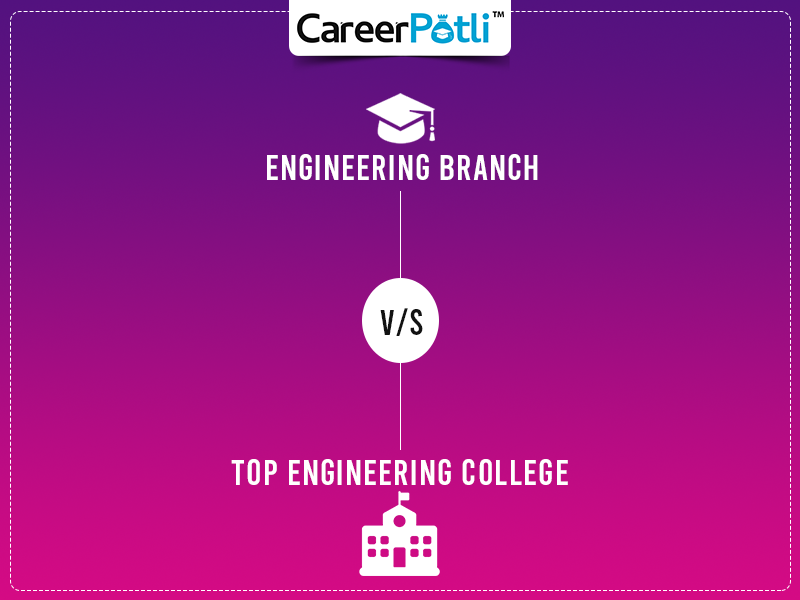Engineering Branch v/s Top Engineering College

With admission processes for several engineering colleges starting soon, students are presented with a massive number of choices in terms of colleges and branches offered. It leads to a very pertinent question – should you pick a course that has your desired branch or go for your desired college?
- The first thing to do when faced with this dilemma is to see which courses are available to you (based on your rank/score in standardized engineering screening tests such as JEE, CET, and other institute tests such as BITSAT, etc.). Then, sort these as per your preferences – which courses you would want to attend based on several criteria such as proximity to home, location, campuses, etc. This should leave you with a list of preferences in order from highest to lowest.
It is recommended that you also go through the course content and syllabus of these courses before ordering them on your list. In essence, this would help you decide whether you have an interest and aptitude for it. It is essential because you will have to stick with this for four years, and it will heavily influence your career and future.
The answer to the above question is extremely subjective and depends on a variety of factors. Please remember that at the end of the day, you need to answer this question for yourself, and try to keep outside influences such as peer pressure or familial pressure to a minimum. Of course, if you do happen to get a branch that you are interested in at a prestigious and reputed college, you should have no qualms about going there.
This article will list some of the factors involved to help you make an informed decision (assuming your dilemma is between picking a branch that you aren’t very interested in at a prestigious institute, and a branch that you like and would consider pursuing at a lesser-known institute) :
Career (including Post-graduate Degree and Job) Prospects
- If you are planning to pursue an MBA after graduation (with or without job experience), it would be better to opt for the prestigious engineering institute. It is merely because better institutes have good recruiters offering a high number of jobs with decent packages, and have a better reputation – this means that if you want job experience before applying to prestigious institutes abroad or in India, you have a degree from a reputed institute and an excellent job on your resume. Even if you apply to MBA institutes immediately after graduation, having a degree from a prestigious college lends weight to your profile and can give you an edge over other candidates.
- If you are planning to pursue an M.Tech/M.Sc. in the branch being offered or in a related course, you should take the desired branch and do well academically. Having an excellent academic score would help you get admission into your desired institute for the Post-Graduate degree, and you will be able to pursue your interest in the respective field.
- If you want to work for core engineering companies with specific skill and degree requirements, go for the branch being offered. This also gives you scope for specialization through post-graduate courses in the future. On the other hand, if you plan to work for non-core companies (sectors such as finance, consulting, analytics, etc.) or in a family business, we’d suggest picking the institute due to good recruiters hiring on a large scale.
- If you have entrepreneurial ambitions, you must weigh whether you want to innovate in your core engineering branch or in general (where your ideas may not be restricted to the specific branch or even to engineering as a whole). If you wish to innovate generally, institutes might be a better bet – most prestigious institutes have start-up incubators as well as faculty and alumni who can guide you on your entrepreneurial journey, not to mention that being alum or students of such institutes can go a long way in helping you get investments and funding. For innovation in core engineering branches, the branch would be an obvious answer if you have a passion for the subject and the ideas to make things better.
Faculty:
Reputed institutes have excellent faculty that know their subjects and teach them well, giving you a thorough understanding and enabling you to think critically and solve problems as an engineer. For lesser-known colleges, this may not be true all the time.
College Environment and Extracurriculars:
Keep in mind that you have to spend four years with the course you pick and that these will be your formative years. Therefore, you need to develop aspects of your personality and learn soft-skills, as well as polish your resume with extracurricular, non-academic achievements. A right college environment with several clubs, sports, and other activities can go a long way in helping with this aspect of your engineering education.
Constraints:
Students may face limitations such as financing their education, proximity to their home, and the overall comfort in respective urban/rural environments. Since these are subjective and vary depending upon students, these must be considered individually while making a decision.
Lastly, talk to seniors, family members, teachers, and people who can help you make a decision, but do not give their advice an overwhelming weightage in your final decision. Remember that this is your decision to make, and it is essential for you to choose what is right for you because this is where your career begins.
